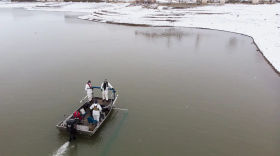-
The concern comes after Tina Jackson, who led the species’ recovery across 12 states–including Montana, Wyoming, Colorado, Utah, New Mexico and Arizona–was fired as part of the Trump Administration’s federal workforce cuts.
-
Workers at the Rocky Flats plant northwest of Denver helped build nuclear weapons during the Cold War. The plant is gone and the land is now a wildlife refuge. A new documentary looks at the controversial history of Rocky Flats, and the memories of its employees. We talk with the director, on today’s In The NoCo.
-
U.S. Fish and Wildlife Service and local wolf advocates are now offering rewards for tips that help identify and prosecute the person who shot the wolf.
-
Here’s a scorecard of the wins and losses for threatened species in the West. Listen to "Morning Edition" host Michael Lyle, Jr. discuss this story with Colorado Sun reporter Michael Booth and then read The Colorado Sun story at the link below.
-
It includes critical habitat designations for the first time in the Southern Rocky Mountains of Colorado and New Mexico.
-
Workers at the Rocky Flats plant northwest of Denver helped build nuclear weapons during the Cold War. The plant is gone now, buried beneath land that’s now a wildlife refuge. A new documentary opening at the Denver Film Festival looks at the controversial history of Rocky Flats, and the memories of its employees. We hear from the director, on today's In The NoCo.
-
The U.S. Fish and Wildlife Service is asking a federal appeals court to reinstate a rule that removed gray wolves from Endangered Species Act protections.
-
Invasive zebra mussels have arrived in the Colorado River. State wildlife officials said signs of the mussels were found in the river and a canal on the Western Slope. The Colorado Sun reports the invaders pose huge risks to water infrastructure and fish populations.
-
Six conservation groups have filed a lawsuit challenging a recent U.S. government decision not to protect wolves in northern Rocky Mountain states as an endangered species. The groups argue in the federal lawsuit filed July 2 in Montana that those states are exercising too much leeway to keep the predators' numbers to a minimum.
-
Colorado’s bald eagle population was hit hard by avian influenza in 2022, reducing the number of nests by about 20 percent. But now, the eagles have made a remarkable recovery.

Play Live Radio
Next Up:
0:00
0:00
Available On Air Stations









